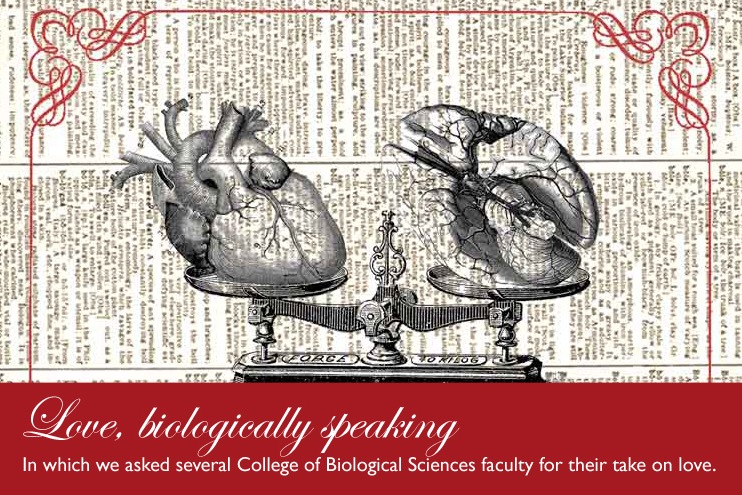
| Sehoya Cotner // Biology → Well, ultimately, love is an adaptation for raising babies. We love our mates and our children, and everybody wins. In a proximate sense, love appears to be mitigated by the nine-unit neuropeptides oxytocin and vasopressin. Humans vary in their production of receptors for these wonder drugs, and thus vary somewhat in their capacity to love and respond to love. But that surge of well-being you feel when you nurse your baby? Or after sex? Oxytocin! That warm squishy feeling when you see an image of your mate? Vasopressin! (Well, at least if you're a prairie vole …) Is this view dystopic? Perhaps. If we could get oxytocin and vasopressin in pill form, would we bother with the inconvenience of mating, the financial and emotional cost of raising children, or the pain of childbirth? Perhaps not! (You aren't going to show this to my husband, are you?) |

| Robert Elde // CBS Dean's Office and Neuroscience → First, a disclaimer, my neuroscience expertise is pain, not love. Although, in some cases the two do seem to be related. Kidding aside, love is mostly a human attribute. Most of what we have in terms of behaviors are really important and have been selected for over evolutionary time. The stuff that’s so particular about humans (as far as we know), is that top layer of feelings and emotions we connect with our concept of love. While love clearly co-evolved with sexual reproduction it's probably not all about that. We are a social animal and part of the social bonding is just extra affinity for one other individual or a small group of individuals to which that is really more profoundly manifest; a condition otherwise known as love. |
| Michele Price // Biology → You are asking an entomologist and, let's face it, insects know how to find mates. As many animals do, from bugs to slugs to monkeys, they can locate a mate through chemicals in the air called pheromones. These airborne chemicals can affect the behavior or physiology in another organism of the same species. So, is love in the air when it comes to humans? Recent evidence suggests that this may be so. The smell of tears (sad tears, not tears of joy) can act like an anti-love pheromone leading to reductions in sexual arousal and testosterone levels in exposed men. Androstadienone (a component of male sweat) was found to increase cooperative behavior in the decision-making tasks between men and has been reported to influence women's attraction to men. Also of note is that one’s nose can possibly seek out a genetically compatible mate as shown in another study where women preferred the smell of sweaty T-shirts worn by men with significantly different MHC (Major Histocompatibility Complex) genes. When it comes to physical attraction and falling in love, no doubt the eyes and brain are very much involved. But, with more research we may be interested in what the nose knows as well. |
| Clarence Lehman // CBS Dean's Office and Ecology, Evolution and Behavior →Adhere to the tenets of physical biology and you could conclude that love is merely electrochemical signals in the brain. Is it nothing more? Does it have no abstract existence in the realm of mind, independent of brain? For a parallel, think of mathematics. Pi=3.14159 arises in the human brain, so is it merely electrochemical signals as well? No, it has its own independent existence, its own claim on the structure of the universe. Minds alien to our own would discover and apply Pi as we do. On this Valentine's Day, let us contemplate the independent existence of love. |
| Emilie Snell-Rood // Ecology, Evolution and Behavior → An animal behaviorist asked about the meaning of love might consider both a mechanistic (proximate) and functional (ultimate) explanation. At one level, we might think about love as the emergent result of neurons firing in the amygdala or hormones like oxytocin binding to receptors in brain regions such as the nucleus accumbens. At another level, we might explain love as an evolved emotion meant to solidify pair bonds in species that require intensive parental care of dependent young or to strengthen social relationships that lead to access to food or protection from predators. Some may see such biological explanations as detracting from the magic of emotions such as love. However, such a perspective allows us to hypothesize what other animals might feel similar emotions, while appreciating the evolutionary history that brought us to a point where we can recognize, understand and celebrate such emotions. |

| Robin Wright // CBS Dean's Office and Genetics, Cell Biology and Development → When you snuggle with your special someone, your bloodstream and your brain are flooded with oxytocin. That oxytocin affects your body and your brain in strange and wonderful ways! To a cell biologist, love is oxytocin intoxication. |



